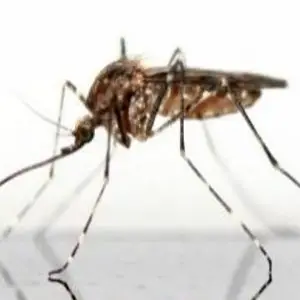As it turns out, mosquitoes use light to help them find their way around. They rely on the sun to help them navigate, and they’re also attracted to artificial light sources like lamps and candles. But are mosquitoes specifically attracted to UV light? Find out below.
What are mosquitoes?
Mosquitoes are small, fly-like insects that are found all over the world. They are known for their habit of sucking blood from humans and animals, which can transmit diseases like malaria, dengue fever, and Zika virus.
What is UV light?
Ultraviolet (UV) light is a type of electromagnetic radiation. Electromagnetic radiation is a form of energy that travels through the air and can be absorbed by matter. UV light has shorter wavelengths than visible light, making it invisible to the human eye.
UV light is found in sunlight, and it can also be produced by man-made sources, such as tanning beds and black lights. UV light can be harmful to humans and animals if it is absorbed in large amounts. It can damage the DNA in cells, which can lead to skin cancer. It can also cause eye damage, such as cataracts.
Are mosquitos attracted to UV light?
Mosquitoes are attracted to the ultraviolet (UV) light that is emitted by the sun, which is why they are more active during the day. However, they can also be active at night if there is enough artificial light from things like streetlights or porch lights.
There are many different ways to keep mosquitoes away from you, including using mosquito repellent, wearing long-sleeved clothing, and staying in well-screened or air-conditioned areas.
How do mosquito traps work?
Traps that use light to attract mosquitoes are sometimes called “zappers.” These traps take advantage of the fact that both male and female mosquitoes are attracted to UV light. The light source attracts the mosquito that enters the trap where he or she is electrocuted.
Many traps also take advantage of the fact that female mosquitoes are attracted to carbon dioxide (CO2). The traps mimic the presence of a large animal by releasing CO2 gas into the air. The CO2 gas attracts the female mosquito who then enters the trap where she is either captured or killed.
What do mosquitoes need to survive?
If you want to trap mosquitoes, it’s important to know what they need to survive and mate. First, female mosquitoes need blood in order to produce eggs. Second, both male and female mosquitoes need water in order to grow from larvae into adults. If you eliminate either of these two needs, you can effectively reduce the mosquito population in an area.
How does UV light work?
UV light is a type of electromagnetic radiation. It is made up of short, high-energy waves. UV light is invisible to the human eye.
UV light can be divided into three types, based on its wavelength:
- UVA: The longest wavelength, it makes up 95% of the UV light that reaches the earth. It can penetrate clouds and glass. UVA rays are responsible for tanning and skin aging. They can also cause some genetic damage.
- UVB: The second longest wavelength, it makes up 5% of the UV light that reaches the earth. UVB rays cannot penetrate glass but can penetrate clouds. They are the major cause of skin reddening and sunburns. They can also cause some genetic damage and play a role in the development of skin cancer.
- UVC: The shortest wavelength, it is completely absorbed by the atmosphere and does not reach the earth.
Tip: Sunscreen works by absorbing or reflecting UV light before it hits your skin.
What is the difference between UV light and other light sources?
Ultraviolet (UV) light is electromagnetic radiation with a wavelength in therange of 10 nm to 400 nm, shorter than that of visible light but longer than X-rays. UV radiation is present in sunlight, and is responsible for the suntanning of skin. It can also be produced by electric arcs and specialized lights, such as mercury-vapor lamps, tanning lamps, and black lights.
Although long-wavelength ultraviolet is not considered harmful to human health, research suggests that exposure to short-wavelength UV from solar radiation or artificial sources can cause skin cancer and cataracts.
How does UV light attract mosquitoes?
Mosquitoes are attracted to UV light. In fact, they’re attracted to all kinds of light. But why?
Mosquitoes are attracted to the UV light given off by the sun, but they are also drawn to heat and carbon dioxide. When UV light hits their eyes, it tricks them into thinking that a predator is near. The heat and CO2 emitted by our bodies make us even more appealing to them.
What are the benefits of using UV light to attract mosquitoes?
There are several benefits to using UV light to attract mosquitoes:
- It is a more efficient way to target mosquitoes, as they are attracted to the light.
- It is more environmentally friendly than using chemical pesticides.
- It is less likely to harm other insects and animals than chemical pesticides.
- It is less likely to cause resistance in mosquito populations than chemical pesticides.
Are there any drawbacks to using UV light to attract mosquitoes?
There are no drawbacks to using UV light to attract mosquitoes. In fact, this method is one of the most effective ways to control mosquito populations.
In Closing
So if you’re trying to keep mosquitoes away from your home, you might want to try investing in some mosquito-repellent UV lights. These can help keep the little pests at bay, and they might just give you a bit of a glow in the process!
NEXT UP: What Are UV Lights Used For?

